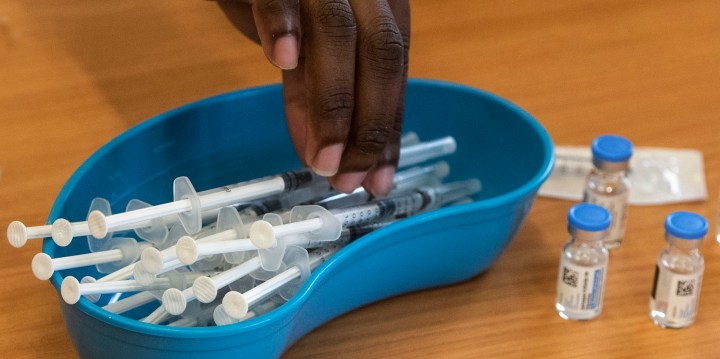GENDER RIGHTS
Study shows impact of Covid-19 vaccines on menstrual cycles not clinically significant – Society of Obstetricians & Gynaecologists

A study into the disruption of menstrual cycles experienced by a few women after receiving the Covid-19 vaccine shows that menstruation is not significantly affected by the vaccine, the president of the South African Society of Obstetricians & Gynaecologists, Dr Haynes van der Merwe, said this week.
Dr Haynes van der Merwe, the president of the South African Society of Obstetricians & Gynaecologists (Sasog), responded to a statement issued by the Commission for Gender Equality using the study into the disruption of menstrual cycles experienced by a few women after receiving the Covid-19 vaccine as an argument for why businesses should not be implementing mandatory vaccines in the workplace.
“The study in question showed that women experienced a 0.7 day increase in cycle length following vaccination. There was no increase in the number of bleeding days but a slightly longer time between bleeding. This was temporary and not clinically relevant. This study is therefore reassuring and shows that menstruation is not affected by the Covid vaccination. Sasog also wishes to emphasise that the benefits of vaccination far outweigh the risks,” Van der Merwe said.
The commission issued the statement late last week using the study as grounds to warn against mandatory Covid-19 vaccines, but spokesperson Javu Baloyi this week ignored all requests and questions. Department of Health spokesperson Foster Mohale said he had not seen the statement.
This is what the statement said:
“As South Africa continues to contain the spread of the Covid-19 pandemic, the Commission for Gender Equality has noted a new study published in [the] Obstetrics & Gynecology medical journal, released on 5 January 2022, that has found that vaccines may cause a small change to the menstrual cycle length, but that this change is temporary. While health experts believe this finding is not clinically significant, the commission would like to caution businesses and various institutions against forcing employees to vaccinate and imposing harsh sanctions on them if they do not.
“The commission is aware that several companies in the corporate and retail sectors have introduced mandatory vaccinations in their workplaces, and many more may follow suit. The commission would like to warn that mandatory vaccination mandates do not supersede South Africa’s Constitution and its provisions… The commission is concerned that employees who do not vaccinate may have their contracts terminated by employers if vaccination mandates are allowed to continue without taking the workers’ human rights into consideration.
“The country’s retail sector employs a high number of young females as cashiers and cleaners, and many of them are not in a position to negotiate with their employers, if they do not wish to vaccinate. Maintaining public health, reaching herd immunity and preventing mutating Covid-19 variants are noble acts but should not be achieved by trampling the basic human rights that are enshrined in the Constitution.
“When scientists establish a connection between Covid-19 vaccinations and women’s reproductive health, such as menstrual cycles, many women may not be comfortable taking vaccines, due to possible long-term effects. These women’s wish to delay vaccinating should be respected in the context of our country’s human rights commitment. The commission is also calling for institutions of higher learning to afford the same respect to students and workers who may not wish to vaccinate.
“Due to our country’s legacy of oppression, economic inequality and limited access to information, many students and workers are not empowered to negotiate with big corporations and institutions. The commission has long taken a commitment to promote and protect the sexual and reproductive health rights of girls, women and men. It must be acknowledged that Covid-19 is a relatively new pandemic, and that scientists in South Africa and around the world are still working to assess long-term effects of vaccines. This is more critical for women, who have to manage menstrual health, contraception and sexual reproduction, as part of their reproductive health.”
A spokesperson for the South African Health Products Regulatory Authority (Sahpra), Yuven Gounden, said that since the national roll-out of Covid-19 vaccines in South Africa on 17 May 2021, Sahpra and the Department of Health have received a small number of reports of menstrual disorders (interruption of menstrual cycles) as an adverse event following vaccination with the Covid-19 vaccine.
“Taking into consideration a total of 9.85 million vaccinations recorded for the adult female population in South Africa as at 7 January 2022, the reporting rate is 0.81 per 100,000 vaccinations in the mentioned population. This number is relatively low when compared with the number of vaccinations recorded.
“Menstrual disorders are common among women and can be caused by various factors such as stress, lifestyle or environmental influences, underlying medical conditions or use of other medicines such as combined oral contraceptive pills.
“Studies have reported that most women may have experienced changes to their menstrual cycle due to the Covid-19 pandemic-related factors such as behavioural changes, anxiety and Covid-19 infections. Different countries have received reports of menstrual disorder events following Covid-19 vaccination with no causal relationship, and the mechanism of how these events occur is still unknown.
“Sahpra and the Department of Health are continually monitoring menstrual disorder events reported in association with Covid-19 vaccines owing to the fact that such events have a potential to derail Covid-19 vaccination in women of child-bearing age.
“The significance of changes in the menstrual cycle following Covid-19 vaccinations can only be determined by understanding the biological mechanisms in which these events occur.
“Further research to investigate how Covid-19 vaccinations can disrupt a woman’s menstrual cycle is required.
“We further encourage the public to report suspected adverse events they have experienced following use of medicines and vaccines. Reporting can be done at a health facility or by downloading the Med Safety App, which is available for Android and iOS phones, or they can phone the Covid-19 hotline on 0800 029 999,” Gounden said.
The disruption of menstrual cycles is seen in women receiving both mRNA vaccines such as the Pfizer vaccine and those who have received adenovirus-based vaccines such as the Johnson & Johnson vaccine, and has also previously been reported after the human papillomavirus vaccine. DM168
This story first appeared in our weekly Daily Maverick 168 newspaper which is available for R25 at Pick n Pay, Exclusive Books and airport bookstores. For your nearest stockist, please click here.

















 Become an Insider
Become an Insider
Comments - Please login in order to comment.